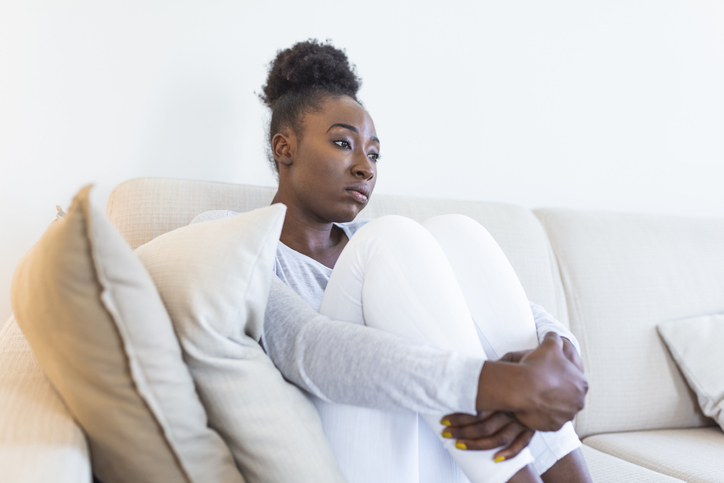Anxiety Attacks Vs Panic Attacks: What's The Difference?
SUNDAY NOIRE: What’s The Difference Between Anxiety Attacks Vs Panic Attacks?
Share the post
Share this link via
Or copy link

Source: yourstockbank / Getty
Anxiety and panic have always been a part of the human condition. However, with civil unrest, another turbulent election soon in our laps, and a pandemic with an on-again off-again nature, anxiety and panic seem more prevalent. According to the National Institute of Mental Health, an estimated 31.1 percent of U.S. adults experience an anxiety disorder at some point in their lives, and 4.7 percent experience a panic disorder. The fact that those are two different statistics might come as a surprise, because panic and anxiety disorders are often mistaken for one another – as are panic and anxiety attacks.
If you have ever experienced either one, differentiating the two might seem like arguing over semantics. However, regular panic attacks can be a symptom of a panic disorder, which requires special treatment. It is important to understand the difference between these two experiences so you can better understand what to discuss with a doctor and get closer to finding relief.
Love MadameNoire? Get more! Join the MadameNoire Newsletter
We care about your data. See our privacy policy.
The Main Difference Between Panic Attacks And Anxiety Attacks

Source: dragana991 / Getty
Panic and anxiety attacks share many similarities, which we’ll get to. So differentiating them is easier done by explaining the one thing they do not have in common: while both panic and anxiety attacks can have what experts call “expected” triggers (i.e. an anxiety-inducing event immediately preceding the attack), only panic attacks can come on seemingly out of nowhere and for no detectable reason. Anxiety attacks will come from a stressful event, says the National Institute of Mental Health, so they’re easier to predict.
This difference might seem small, but it is what makes a panic disorder so debilitating for those who struggle with it. If your attacks follow a stressful event, it becomes easier to determine what might trigger an attack and how to avoid it. However, because panic attacks can come on out of the blue, people who suffer from them can develop an overwhelming fear of going just about anywhere or doing anything; they have no clue what could set off their panic attacks.
The Symptoms Of Panic + Anxiety Attacks

Source: Rabizo / Getty
There is one other important difference between these two conditions: anxiety attacks don’t have an actual diagnostic definition and panic attacks do. So though we are going to cover the symptoms for both, it’s worth noting that anxiety attack symptoms vary by person, and their symptoms are self-reported rather than confirmed by the medical community.
Symptoms of both types of attacks include:
- Worry, fear, stress
- The belief you will die or are losing control
- Out-of-body experience
- Racing heart
- Tight chest
- Difficulty breathing
- Sweating
- Hot flashes or chills
- Trembling
- Nausea
- Dizziness
One symptom that differs between the attacks is actually in the ramp-up to the attack. Anxiety attacks can come after anxiety that has been building gradually for hours or even days. An anxiety attack is often the breaking point of anxiety that has been slowly increasing. A panic attack, however, can come on when the person felt completely fine just moments before.
Causes Of Anxiety And Panic Attacks

Source: stefanamer / Getty
While it’s nearly impossible to determine the cause of an unexpected panic attack, triggers of panic and anxiety attacks might include:
- Memory of a traumatic event
- Exposure to a phobia
- Social situations (i.e. social anxiety)
- Drug or alcohol withdrawal
- Excess caffeine consumption
- Driving or flying
- Stressful work environment
In addition to the immediate triggers of anxiety and panic attacks, there can also be general conditions in one’s life that makes them more likely to suffer one of these attacks. Both panic and anxiety attacks have been found to be more common in individuals who:
- Have suffered a traumatic event at any point in their life
- Have witnessed something traumatic such as a violent incident
- Are going through a stressful life event (such as divorce, death, or bankruptcy)
- Have anxiety or panic disorders in their family
- Struggles with anxiety
Once you and your doctor have determined whether you struggle with anxiety or panic attacks, you can move toward treatment. These might include different types of therapy such as cognitive behavioral, talk or exposure therapy. In some cases, support groups can be helpful. Your doctor might prescribe anti-anxiety medication if they deem it necessary.
RELATED CONTENT: 8 Best Cities That Promote Mental Health And Wellness






